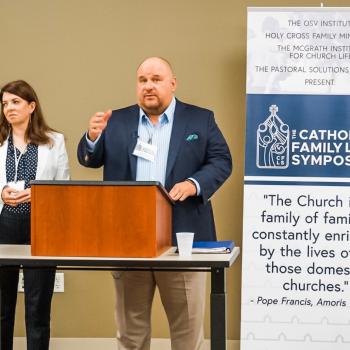I had a conversation with a reporter yesterday from a prominent newspaper about the ongoing Synod on the Family. We had a great discussion and I appreciated her time. In particular, we talked a lot about people who felt alienated from the Church (and those who are divorced and remarried in particular). The conversation left me in a thoughtful mood. In particular, I was left reflecting on the question, “Why, exactly, do so many people feel excluded by the Church–especially those who are divorced and remarried–and what can we do about it?”
Missing the Mission.
People’s anger at the Church is real and deserves to be met with respect and compassion. At the same time, it appears to me that a lot of the anger and pain is caused by confusion about what Church is and what it’s meant to do. In order to appropriately address people’s hurt, I think we, as Church, need to do a better job of communicating our mission. What does that mean?
The Church as Hospital
Pope Francis noted that the Church is a hospital. That sounds very affirming and it is. But what people forget is that you only need to go to the hospital if you’re sick. At the point when you think you’re healthy, you either don’t need the hospital or you have to leave it.
The problem–in our metaphor of Church as hospital–is that, these days, a lot of people come to the hospital because they think it is a nice building with a lot of interesting equipment in it and they want to explore the various rooms. Eventually, they bump into a doctor. Mistaking them for a patient, he asks what’s wrong with them. They become offended and exclaim, “How dare you say there is something wrong with me?!?” The doctor stares at the erstwhile patient and, in all innocence, says, “Well then, if you aren’t sick, then what are you doing here? You’re not just trespassing are you?” And the person screams, “How dare you try to exclude me!”
What’s Your Diagnosis?
The Church is far from perfect, but too often people who assert that they are alienated from the Church feel that way primarily because the Church necessarily insists that to be a member you have to be willing to admit that you (1) are spiritually sick, (2) that you need a diagnosis (i.e., “sinner”), and (3) that you must be willing to participate in the treatment. If you aren’t willing to do those things, you really have no business taking beds and food away from the patients who are lining up in the hall waiting to be admitted. If you’re really so healthy, what are you doing playing with the IV’s? Go, live your life! Be happy!
It isn’t that people’s anger at the Church isn’t real and doesn’t deserve to be respected, but that doesn’t change the fact that the Church is really only for people who are willing to see it as the place where they get diagnosed and treated for the spiritual diseases that are preventing them from receiving the gift of eternal life.
Marriage: Here’s Your Sign…
As I mentioned above, much of my conversation with the reporter focused, specifically, on the fact that Catholics who have remarried after divorce feel excluded from the Church. This is a profoundly sad and painful reality. But to understand why these couples are not admitted to communion, you need to understand that the Church thinks of marriage differently than the world does. While the Church certainly values the earthly benefits of marriage, the Church primarily values marriage because of what it points toward. Marriage is meant to be an icon to the world; a physical sign of the kind of unconditional, committed love God wants to share with each of us (Eph 5:31-32). The fact that God wants this kind of relationship with us is a mind-blowing concept. It’s hard to get our heads around it. We need some kind of experience–some physical sign– that shows us this sort of love is even possible. This is where marriage comes in. The Church intends sacramental marriage to be a sign to the world that the kind of love God wants to share with us really is possible.
A Broken Sign
When the Church says that there is something wrong with remarriage after divorce (without the benefit of an annulment) it isn’t saying that the couple can’t somehow manage to be happy together or that there is anything (necessarily) wrong with that couple’s relationship from a worldly POV. It is, however, saying that that the couples’ “sign” is broken. That is, they cannot adequately represent to the world the faithful love that Bridegroom Christ has for the his Bride, the Church. That really isn’t a judgment against the couple. It is a spiritual diagnosis. Having broken communion in their marriage, the divorced and remarried Catholic (who has not sought the benefit of an annulment) now becomes a de facto sign of the broken communion that exists when we are unfaithful to the Christ, the Bridegroom. People who have remarried after divorce without the benefit of an annulment are still very much welcome in church, but their lives now becomes a visible sign of the alienation we experience when we are unfaithful to the Bridegroom–as we often are. This is a very painful reality but it is not a judgment on divorced and remarried couples. Rather, it is an acknowledgment that the sign they are attempting to live through their remarriage is, in fact, seriously broken and that they are in need of healing. The Church is eager to do whatever is possible to facilitate that healing and so she welcomes the divorce and remarried person just like she welcomes any other patient to the hospital, not with judgment, but with a diagnosis and a treatment plan.
A Painful Course of Treatment
Because it cuts right through the heart of the primary image God uses to reveal his love for the Church, remarriage after divorce (without the benefit of an annulment) is a particularly serious spiritual disorder. Currently, there are only two treatment options; either the couple can embrace the penance of living as brother and sister unless or until they can receive a declaration of nullity for the original and still valid marriage, or the couple can embrace the penance of being that broken sign and refrain from communion. These are painful treatments, but as any cancer patient can tell you, treatments for serious illnesses are often quite painful. Again, the treatment is not a judgment on the couple. It is a recognition of the seriousness of the spiritual disorder.
Asking Important Questions
I understand that a lot of people don’t get this. They feel judged, and that’s a very serious problem. Frankly, the Church has done a horrible job communicating these truths and this is one thing the Synod is attempting to address. One importnat question the Synod Fathers are asking is, “Is there a way that we can continue to do our job of diagnosing and providing treatment for spiritual disorders–such as remarriage after divorce–without making people feel judged by our diagnoses?” Another question is, “Are there treatments for this disorder (of remarriage after divorce) that could work as well but be less painful?” These are important but challenging questions, and there aren’t an easy answers to either of them–hence all the sturm und drang around the synod. But one thing the Church cannot do is say that a spiritual sickness is actually a sign of health, and a broken sign is, actually, not broken.
To learn more about how you can experience a more joyful, loving, passionate, grace-filled marriage, please check out the brand new, revised and expanded 2nd edition or For Better…FOREVER! A Catholic Guide to Lifelong Marriage.

















